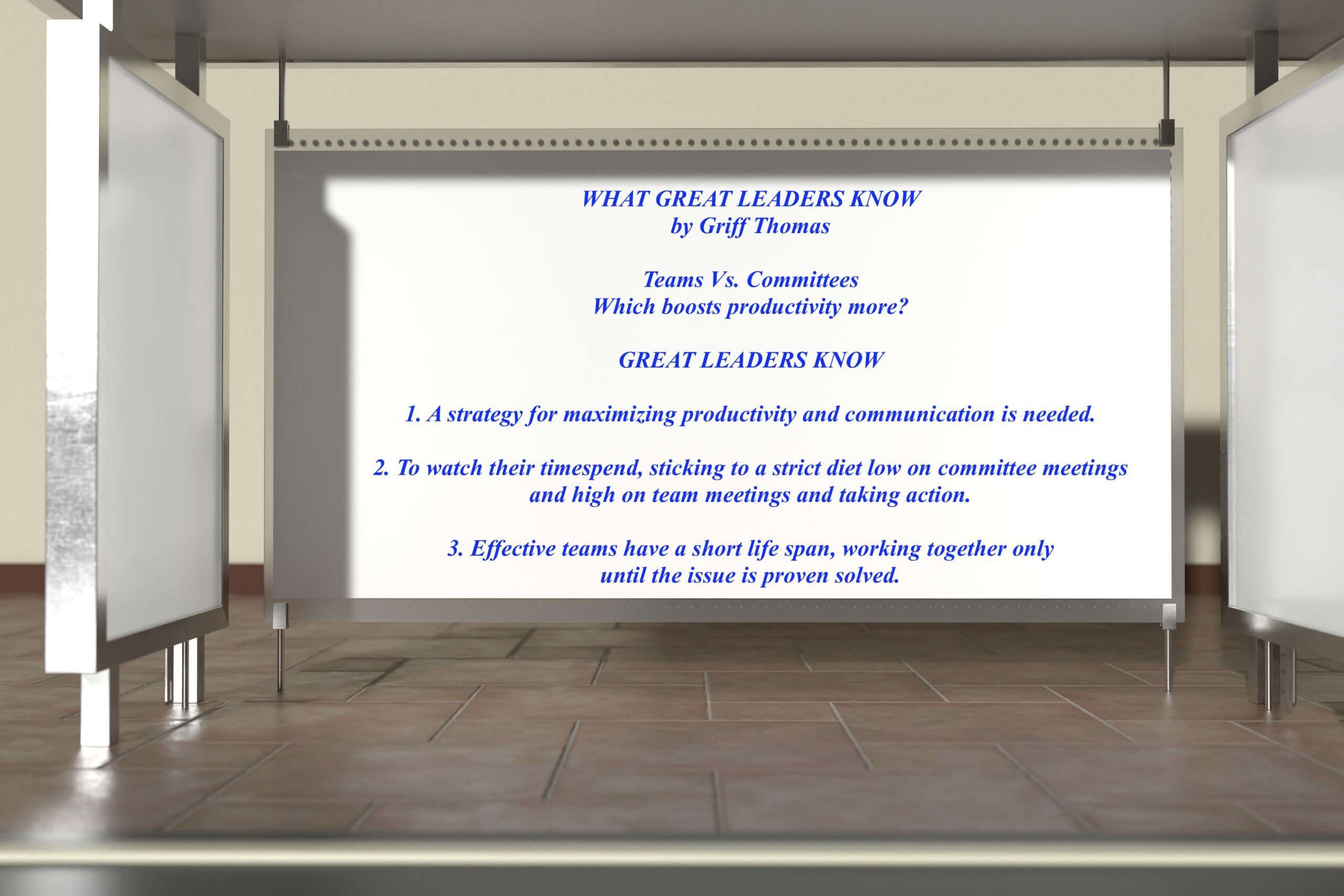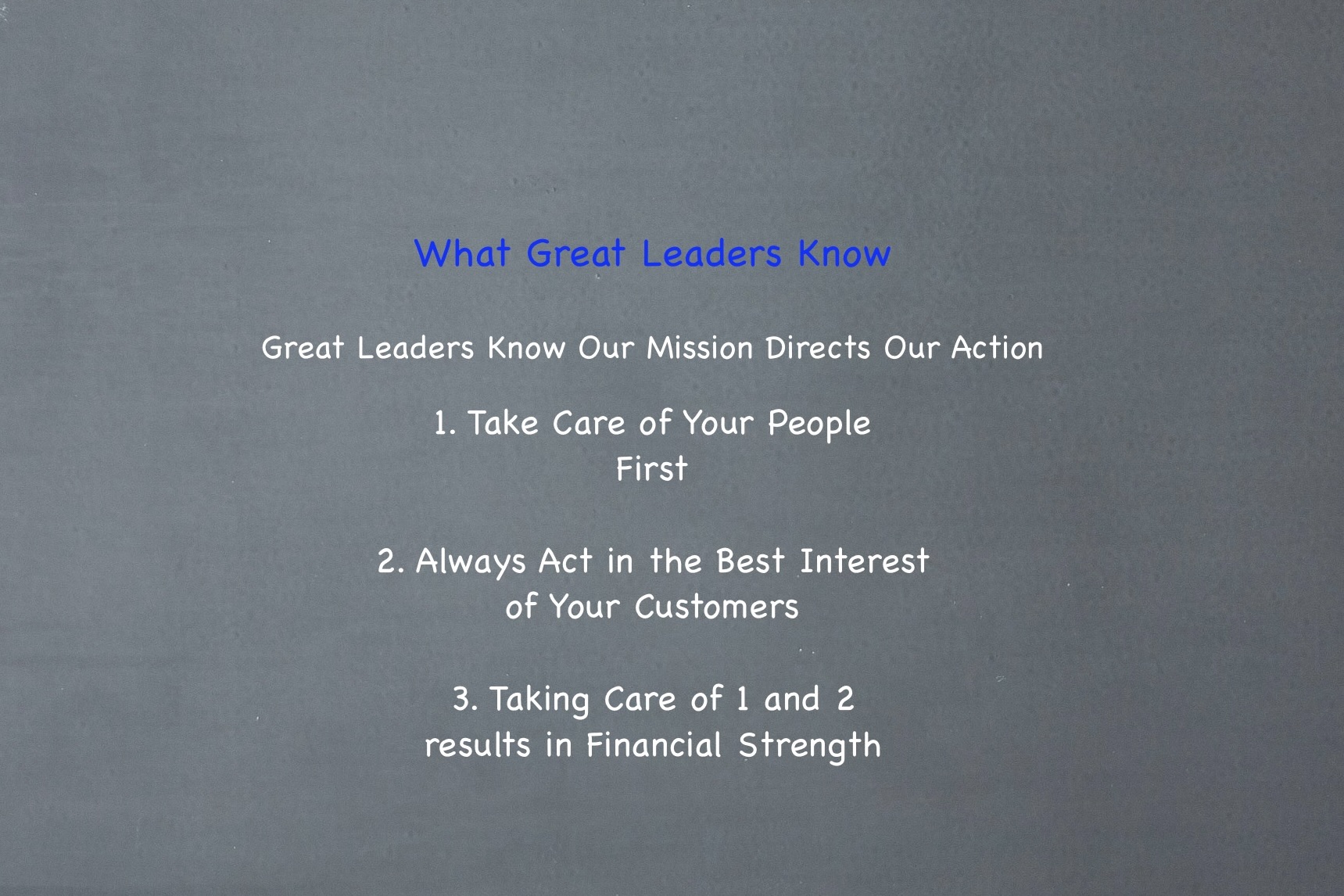Your cart is currently empty!
Tag: #business leadership

Teams Vs. Committees: Which Boosts Productivity More?
Instead of taking action, do you spend too much time in committee meetings talking about taking action rather than taking it? This article provides insight into Teams VS. Committees: Which Boosts Productivity More?
Great leaders watch their timespend, sticking to a strict diet, low on committee meetings and high on team meetings and taking action.
Committee Meetings are necessary as a part of regular communication. Attending more committee meetings, results in getting less actual work done. Being trapped in the committee square dance, exiting one committee meeting and entering the next, decreases effectiveness. So, Teams Vs. Committees: Which Boosts Productivity More?
A team is not a committee and A committee is not a team.
Committees exist to exist and monitor while teams exist to accomplish, consequently, I advocate for teams to avoid committees. Feeling overcommitteed, I met with every committee leader and explained I supported their committee, but I would only participate on issues directly related to my team. I continued to collaborate and communicate in the normal course of my work but I was committee free!
Ineffective committees can act as the carbohydrates of a business leading to work process sluggishness.
Teams assemble to address a specific issue, focus on movement, progress, results and resolution. Overall, effective teams enjoy a short life span, working together only until the issue is proven solved. Proven solved!
Great Leaders investigate their work area with team members, customers, exploring new technologies, ideating, measuring performance. Staying free of obligatory meetings clog the wheels of progress.
Leaders must prioritize and find the balance between observing operations or attending meetings, Observing operations, understanding customers, improving operations, focuses on the present and future, which teams impact. Committees Traditionally look back. This illustrates Teams Vs. Committees: Which Boosts Productivity More?
Team Vs Committee Approach– Hospital Hand Washing Example
Leapfrog reports only 74% of hospitals met CDC hand washing standards in 2023, an improvement from prior years, however hospital hand washing standards have been in place since the 1980s. Physicians started scrubbing before surgeries to reduce infections in the 1870s. (National Geographic)
Over the past forty years, many hospitals created oversight committees to gather results, measure compliance and recommend steps for improving. Yet hygiene compliance, has remained an issue in many hospitals for over forty years. I am suggesting a different approach.
Creating a team could prove more effective in driving higher compliance, while reducing hospital acquired infections. How? By defining the mission, providing education, maximizing real time observations, recognizing positive performers and addressing non-compliance directly.
Teams reach beyond committees by directly observing and taking actions in real time.
WHAT GREAT LEADERS KNOW
- Maximizing productivity and communication requires a sound strategy.
- Watching their timespend, sticking to a strict diet low on committee meetings and high on team meetings and taking actions.
- Working together only until the issue is proven solved. Effective teams have a short life span.
LINKS
https://whatgretleadersknow.com
https://www.leapfroggroup.org/sites/default/files/Files/leapfrog-HH-report-2024_FINAL.pdf

OUR MISSION DIRECTS OUR ACTION
In the first minute of my first class in business school at Westminster College, it became apparent. The professor wrote on the board, the purpose of business is to ______ _____. The rest of the class answered in unison “make money” and received a positive nod from the professor. I said “serve people”, earning me a roomful of skeptical looks.
After class, I approached the professor. “The goal of business is to provide something of value to a consumer. Above all, satisfactory service must happen or the business isn’t going to be paid (or stay paid). Service comes first. ” He stood his ground. Looking back, what I wish I had said was-
Different people have different missions, our missions direct our actions.
Great Leaders recognize their team members as their most important customers. Great service only happens when employees willingly give it because they feel satisfied. As a result, their positive actions toward customers are the manifestation. It’s clear that our mission directs our actions in our professional conduct. Ethical choices are always directed by their impact on people.
I stood alone in my MBA Business Ethics class arguing on behalf of the consumer. My classmates argued for business profits. In one memorable case, a manufacturer refused voluntary recall on cars they knew exploded during collisions because of the additional expense. Yet, my classmates also said they would not buy the exploding car for themselves. If we object to how we are treated as customers, we should not treat our customers the same way!
Mission directing Actions example
In 1982, tainted bottles of Tylenol resulted in several deaths. The poisoning happened after the bottles were on shelves and did not directly involve the manufacturer Johnson and Johnson. J&J spent $20 million to recall their product! Was this the right decision? Yes! J&J’s decision to recall Tylenol, and introduce tamper resistant caplets and containers, set a new standard for product safety, benefitting millions of customers. Tylenol increased their pain reliever market share from 35 to 37%. Today, Tylenol is an industry leader with a 37% market share. History has proven Johnson and Johnson made a wise decision in taking care of customers first.
Great Leaders Know Our Mission Directs Our Action
1. Take care of your people first
2. Always Act in the best interest of your customers
3. Taking care of number 1 and number 2 results in Financial Strength
Links
https://whatgreatleadersknow.com/
https://en.wikipedia.org/wiki/Chicago_Tylenol_murders
https://www.nytimes.com/1999/07/10/us/4.9-billion-jury-verdict-in-gm-fuel-tank-case.html

Great Leaders Know
Mirroring and Compassing
Great leaders know developing their team significantly improves performance. Teaching and learning happen in many ways. Create a culture where growth happens anywhere and everywhere! A two minute elevator conversation can have a profound affect on an open mind. Mirroring and compassing are essential skills to super charge learning.
Great Leaders are a mirror helping team members see what they are doing well and what they need to do differently. They ask questions of their team members rather than providing the answer, acting as “the goalie” catch the idea and pass it back asking clarifying questions and keeping it in play. Jumping in with the solution stifles the creative thinking of the learner, who, when guided comes up with an innovate and new idea! Great leaders know that it is critical to balance guiding questions and solutions.
If you’re trying to navigate to the North Pole, would you prefer a flag marking your final destination or a compass?
Great Leaders are a compass guiding team members by providing feedback to help them reach their goals. The leader’s role is to foster that development. When working with team members, I stay in development mode. I mirror them- this is what I am seeing, this is what I am hearing you say. This approach certainly takes longer than barking out orders, but is the only method that develops a culture of people knowing their opinions matter. Great Leaders understand responsibility for learning belongs to the learner. Great leaders know fostering ownership is key.
When a team member approaches me to complain about another team member, in most cases, I seek to understand and give them advice on how they should approach this problem rather than providing the solution. We discuss approach until I feel confident they can be successful in resolving the issue. I am guiding them on their journey.
Once a boss sat down with me because they had to complete my annual review. They had met with me 3 times the previous year and had little, if any, idea how I had performed. Ten minutes later, including the 2 calls they took, it was over. What a missed opportunity! When I needed a mirror or a compass, I was just another box to check. This motivated me to know how my staff are performing. During performance reviews, there are no surprises because I have been mirroring and compassing throughout the year. Knowing my team helps me be a better leader.
Great Leaders Know
Developing their team significantly improves performance
Being a mirror for both strengths and opportunities at all times helps individuals and the team. Great leaders know this approach builds trust.
By providing ongoing feedback, a leader serves as a compass for their team members.
Great leaders can provide ongoing feedback, serving as a compass for their team members. Knowing when to mirror or guide is essential.
Links